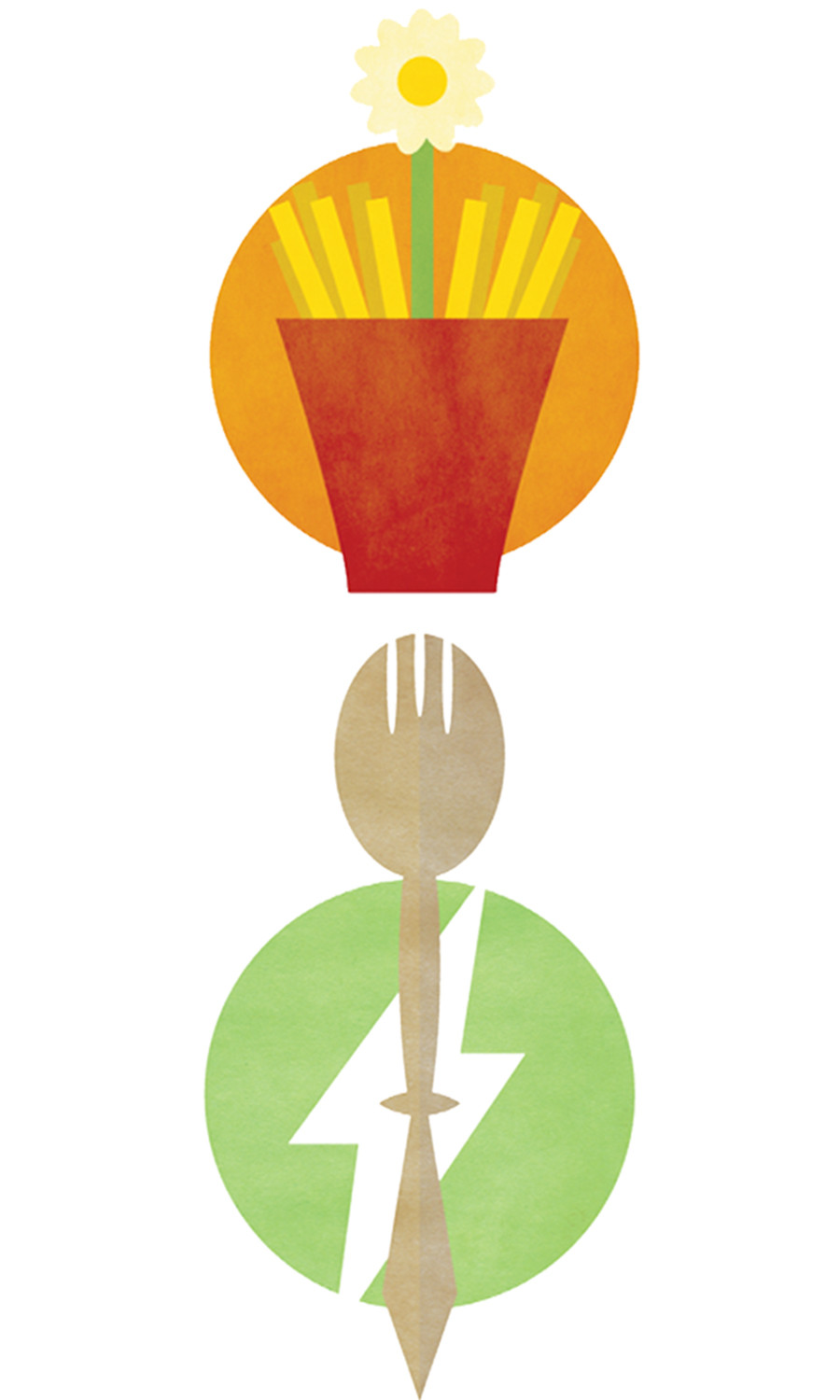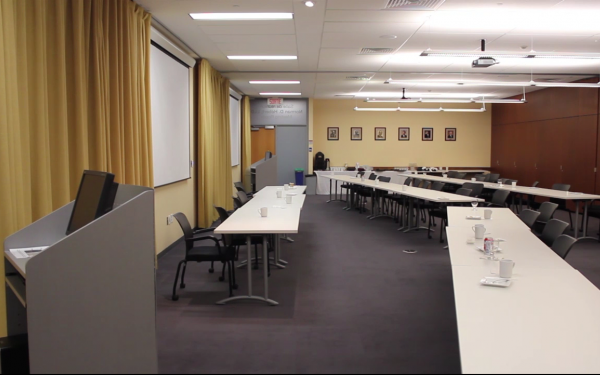With Concordia’s Food Provider Up For Grabs, Students Hope to See a More Equitable Food System
Students Imagine a Student-Run Food Provider on Campus
The contract for Aramark, the company that provides food services on campus, will be ending in 2020. The company has been under fire for the food they serve at prisons.
Last year the American company worth $8.6 billion in January 2017 made headlines after prisoners went on strike to protest foodpoising that resulted from Aramark ‘s food. At the same time, reports of problematic behavioiur from Aramark employees inside prisons surfaced.
In 2012, rancid chicken supplied by the company sickened approximately 250 inmates in a Michigan jail. Two years later, an Aramark employee served food that had been discarded in the trash to inmates. That same year an Aramark Correctional Services worker provided cake to inmates that rats had nibbled on.
There have also been accounts of drug smuggling and sexual advances imposed on inmates by Aramark workers. In 2015, maggots were found in the food an Aramark employee was preparing. It was reported that the Aramark Correctional Services worker told them to keep quiet. In response, an Aramark spokesperson said that inmates were planting maggots in the food.
“They’ve had a lot of issues with the food that they serve—the quality of it,” Concordia Food Coalition Internal Coordinator Sebastián Di Poi told The Link.
Aramark manages residence cafeterias, as well as franchises like Bento Sushi and Tim Hortons. They also manage cafés on campus, like the Green Beet Hall or SP Café. Both Aramark and Café Go are also responsible for the vending machine on campus.
With contract up for renewal or abandonment, the CFC and students on campus have launched an educational campaign with the hopes the Concordia community will push for a more equitable food system.
Aramark first won their contract with the school in May of 2015.
“The five-year fixed contract ends May 31, 2020,” said university spokesperson Mary-Jo Barr. “We can renew for two additional years, until May, 2021, which we intend to do—this will allow us time for the [proposal] process.”
“To the eyes of the university, Aramark has complied and fulfilled their contract so I think that’s why they’re going to renew it,” said Di Poi.
Before Aramark, the corporate food provider Chartwells served food on campus for 13 years. Before Chartwell, Sodexo took the role as Concordia’s food provider.
With years of large corporations being responsible for Concordia’s food system, some students on campus want to see a change.
The Food Autonomy Campaign, known to some as the Food Access Campaign, is taking the opportunity of Concordia’s upcoming contract renewal to mobilize for a change within Concordia’s food system.
They want to see students gain control over the university’s food system.
Di Poi said this campaign is about “pushing the university to give the students more control on what type of food is served at the university, to find alternative options to a multinational food service provider.”
Up until this point, he said the contract renewal has been kept confidential. In the past, Di Poi said negotiations between companies for the food provider contract have always lacked transparency.
“The food autonomy campaign is focused around one; emphasizing more democratic student-run alternatives, and two; trying to figure out ways to work explicitly against Aramark, because they work in the prison industrial system,” said Margot Berner, a board member for the CFC.
Berner said they also want to raise awareness on how Aramark’s practices don’t align with the values that many students hold. She said this includes “values of fair and safe labour practices,” as well as
“providing healthy and wholesome food that’s both socially and environmentally sustainable.”
Di Poi said they hope to stimulate more student-built food providers, businesses and other groups that can take on some of the food services at Concordia.
“It’s trying to get the university to put its money where its mouth is,” said Di Poi.
He said that the university has a sustainability governance framework which covers five streams, one of them being food—so the university should be looking for food providers that use more sustainable practices.
“[Concordia hired] a multinational food provider that is very much a part of the industrial food system that is broken in so many ways,” Di Poi said. He said this is why they want to encourage the university to utilize more social businesses and student involvement, like solidarity cooperatives similar to the Hive Café Solidarity Cooperative.
“We’re not necessarily against corporations just because Aramark is one that we don’t support,” said Di Poi.
Di Poi said it doesn’t necessarily need to be a student cooperative, but could also be a business that falls in line with Concordia’s and students’ goals in a campus food service provider.
Di Poi said he and others involved in Food Autonomy Campaign are not simply hesitant of Aramark being renewed for the contract because they said Aramark is a big corporation. It’s Aramark’s history that’s most concerning to them.
“Aramark and the university in particular are interested […] in greenwashing their brand, but not actually making fundamental changes to their labour practices or the way they provide food, because it’s not as nearly profitable to the individuals that are running Aramark,” said Berner.
“[We wish to] empower people with the knowledge of what is actually going on in our food systems and often there’s this huge disconnect in what you’re eating and what it does socially and environmentally. We’re trying to provide the information that there are alternatives on campus and also alternatives that we can build.”
—Margot Berner
What Students Think
So far they have been no accounts of spoiled food being served at Concordia, but an informal study found that students do not have high regard for the food on campus.
“[Professor] Erik Chevrier [and] his students completed a study of the residences cafés and dining halls and it really demonstrated how poorly students regard the food served to them,” said Di Poi.
He said the administration didn’t see the data required from the study as valid because the form could be filled out more than once, so they felt the survey was not completely accurate.
Chevrier is the research supervisor and board member at the CFC, as well as a part-time professor within the sociology and anthropology department. He said the university also did not take the survey seriously because it was administered through Facebook anonymously.
Currently there are two official reports being conducted on behalf of the CFC. Chevrier was a part of the committee of board members at the CFC in charge of selecting a researcher for the campaign.
Chevrier said there are two different research projects, one looking at food service providers to universities across Canada, and the other looking at previous food contracts at Concordia.
“[We have] interviewed a number of students and faculty that have been involved in the [contract renewal] process and basically looking at what actually came out of the last event and where we can actually make improvements, one of them is to [advocate] for autonomous student-run local food provider initiatives.”
Gabriel Velasco, the researcher for the campaign, said he is looking at 69 universities across the country, focusing on recognized public universities, while cutting out smaller universities. Velasco is also looking at 48 CEGEPs in Quebec.
“What we’re noticing […] is there are certain universities that actually manage food services internally,” said Chevrier. “Certain schools that actually have a number of student-run initiatives that [are] providing [a lot of] food services on campus.”
Chevrier said both of their reports will be out sometime in the fall.
Velasco said the three top food service providers on university campuses are Aramark, Chartwells and Sodexo.
However, some universities are providing students the chance to have autonomy over their food system.
“[Université du Québec à Chicoutimi] is really interesting; their entire food system is student-run out of MAGE-UQAC, which is sort of the equivalent of the Concordia Student Union over there,” he said. “Their student union operates the cafeteria, the food system, two cafés, a bar and catering services.”
“From my understanding, it is the only student-run [university food system] in Canada,” said Velasco.
Velasco said that in Montreal there are good examples of student-run food initiatives, including Université de Québec à Montréal and Université de Montréal.
“On both of those campuses [there’s] a lot of independant operated student cafes, that are associated to those different student associations,” he said. ”So imagine political science having their own student-run café [or] the psychology student association having their own student-run café.”
Velasco said this study is looking at food systems through an economic perspective. He said when a university is not so focused on a profit, they put more energy into serviving good quality food.
When there’s a surplus of profits, the money goes to Aramark, rather than the university, Velasco said. Currently, he said both the university and Aramark are not transparent about how much money gets generated from food services on campus.
Velasco said that at Concordia, a large amount of money is coming from the meal plans offered to residence students, which is mandatory at Concordia. However, some universities make it optional or provide the chance to load a minimum amount of money on their flex dollar cards.
At Concordia, their version of flex dollars, called dining dollars, cannot be used for student cooperatives, such as the Hive or Frigo Vert, it can only go towards Aramark food providers.
The Future of the Campaign
Events will be held on campus to allow more students to get involved and Di Poi said mobilization camps will be organized on campus too. The first camp was at Bite Me Week, held in the last week of September in collaboration with the CSU and the CFC.
He said these camps are teaching students how to campaign and rally for more student involvement and student autonomy over Concordia’s food system.
“[This is] the first official public FAC/CFC event,” he said.
When asked if there will be a protest held, Di Poi said, “it’s possible, I can’t say that it will happen or not—but it’s definitely possible.”
Di Poi said students can expect petitions to go around soon. He said he cannot say the specifics of what will be included within the petition, however, it will involve generating enough signatures to place a referendum question within the next CSU election in relation to students and their food system.
Di Poi said the campaign will begin moving towards tangible manifestation and how further student involvement can take place within the university.
“[We want to] empower people with the knowledge of what is actually going on in our food systems and often there’s this huge disconnect in what you’re eating and what it does socially and environmentally,” said Berner. “We’re trying to provide the information that there are alternatives on campus and also alternatives that we can build.”
“If you want to get involved with FAC, you’re welcome to come to our mob camp, come to our meetings,” she said. Berner also welcomes students who are interested in organizing something similar to The Hive to approach the CFC.
Correction: In a former version of this article, Di Poi was quoted stating, “Aramark isn’t one that we don’t support”. Di Poi said that Aramark is a corporation they do not support. The Link regrets this error.





4_600_375_90_s_c1.jpg)
_600_375_90_s_c1.jpg)